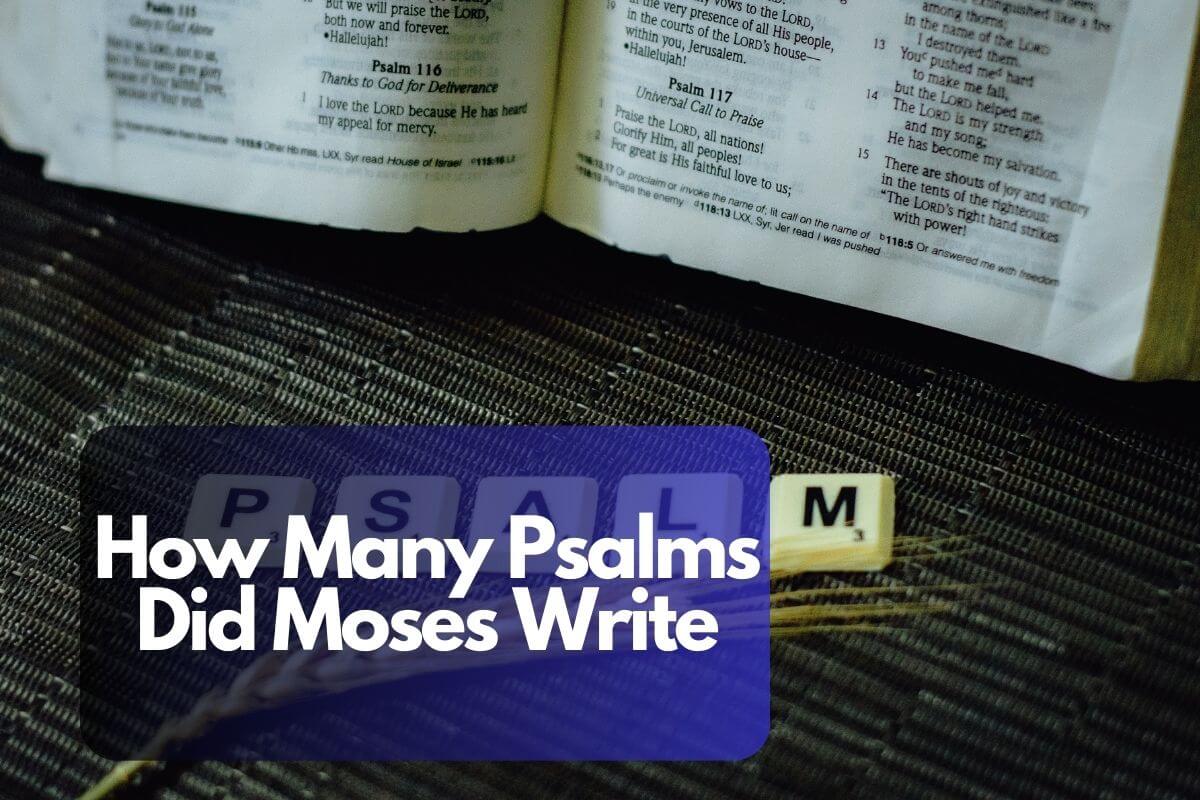The Book of Psalms is a collection of heartfelt prayers and songs that have provided solace and inspiration for countless generations. Amidst the rich tapestry of this sacred text, a question arises: How many psalms did Moses, the revered leader of the Israelites, write? In this article, we delve into the intriguing inquiry surrounding Moses’ authorship of the Psalms. Join us as we explore the evidence, examine the historical context, and seek to uncover the potential contributions of Moses to this beloved book of worship and devotion.
How Many Psalms Did Moses Write
The superscription of Psalm 90 in the Bible states, “A prayer of Moses the man of God.” This attribution has led to the belief that Moses wrote this particular psalm, which reflects on the eternal nature of God and the brevity of human life. The Book of Psalms holds a special place within the Bible, serving as a treasured collection of prayers, hymns, and songs that have been cherished by individuals and communities throughout history. It is a unique and diverse compilation, encompassing a wide range of emotions, experiences, and expressions of faith.
The Psalms address the deepest longings of the human heart, offering comfort, solace, praise, and lamentation. They provide a poetic language through which individuals can connect with God, pouring out their souls and seeking His presence. The Psalms are not only a reflection of the human experience but also a source of inspiration, guidance, and spiritual nourishment for believers.
Introduction to the question of Moses’ authorship of the Psalms
Amidst the rich tapestry of the Psalms, the question of Moses’ authorship arises as a topic of inquiry and speculation. Moses, the central figure in the Old Testament, is known for his role as the leader of the Israelites during their liberation from Egypt and their journey to the Promised Land.
His profound encounters with God and his unique position in Israel’s history make it natural to wonder if he contributed to the collection of Psalms. However, the attribution of specific psalms to Moses is a matter of scholarly debate and interpretation. Exploring this question allows us to delve into the historical context and examine the potential connection between Moses and the Psalms, shedding light on the authorship and origins of this beloved book of worship.
Moses and the Psalms: Historical Context
Moses holds a significant role in the Israelite community as the leader, lawgiver, and prophet. He is attributed with writing the first five books of the Bible, known as the Torah or Pentateuch, which include Genesis, Exodus, Leviticus, Numbers, and Deuteronomy. These books serve as the foundational texts of Israel’s religious and legal traditions. Moses’ authorship of these books establishes his literary contributions to the Hebrew Scriptures.
Understanding the timeline and events associated with Moses’ life
Moses’ life is chronicled in the biblical narrative, beginning with his birth in Egypt, his upbringing in Pharaoh’s court, his escape to Midian, and his eventual call from God to deliver the Israelites from bondage. The Exodus, the wilderness wanderings, and the giving of the Law at Mount Sinai are significant events associated with Moses’ life and ministry. Understanding this timeline helps situate Moses within the historical and cultural context of the Israelite people.
Historical and cultural context of the composition of the Psalms
The composition of the Psalms spans several centuries, encompassing diverse authors, historical periods, and literary styles. While Moses lived during the 13th century BCE, many of the Psalms were written much later, during the time of David and subsequent kings of Israel. The Psalms reflect the collective worship and poetic expression of the Israelite community over generations. Examining the historical and cultural context of the Psalms helps us appreciate the various influences and perspectives that shaped this collection of ancient Hebrew poetry and prayers.
Examining the Claims: Moses as the Author of Psalms
Several psalms in the Book of Psalms are attributed to Moses in their titles or headings, such as Psalm 90. These attributions suggest a connection between Moses and the composition of certain psalms. Evaluating these biblical references involves studying the historical reliability and authorship claims found within the text.
Analyzing the themes, language, and style of psalms often attributed to Moses
To determine Moses’ authorship of the psalms attributed to him, it is important to analyze their themes, language, and style. Comparing these psalms with other writings attributed to Moses, such as the Exodus narrative or the song of Moses in Exodus 15, can provide insights into stylistic similarities or thematic continuity. Additionally, examining the theological and historical contexts within these psalms may shed light on their potential connection to Moses.
Consideration of alternative interpretations and scholarly perspectives
While some traditional views attribute certain psalms to Moses, alternative interpretations and scholarly perspectives exist. These viewpoints may challenge or question Moses’ authorship of the psalms.
It is essential to consider the diverse perspectives from biblical scholars, theologians, and historians who have examined the authorship of the Psalms. Exploring alternative theories and scholarly debates helps to provide a comprehensive understanding of the topic.
Psalms with Possible Connections to Moses
Certain psalms have long been attributed to Moses based on their titles or internal references. These include Psalm 90, which bears the title “A prayer of Moses, the man of God.” Psalm 91 is also sometimes linked to Moses due to its themes of protection and divine presence.
Exploring the content and themes of these psalms in relation to Moses’ life and experiences
Examining the content and themes of these psalms can shed light on their potential connection to Moses. For example, Psalm 90 reflects on the brevity of human life, the eternal nature of God, and the Israelites’ wilderness journey, mirroring Moses’ role as a leader and prophet during their time in the desert. Exploring the language and imagery used in these psalms can offer insights into Moses’ unique perspective and experiences.
Discussing the theological significance and implications of Moses’ authorship, if applicable
If Moses is indeed the author of certain psalms, it holds significant theological implications. Moses, as a central figure in Israel’s history, had a profound relationship with God and played a crucial role in delivering the Israelites from slavery in Egypt. If he authored psalms, it would demonstrate the intimate connection between his personal experiences, his encounters with God, and his poetic expression of faith and praise.
However, it is important to note that the authorship of the Psalms, including those traditionally attributed to Moses, remains a subject of scholarly debate. Alternative theories propose different origins or contributors to these psalms. Exploring these various perspectives helps us appreciate the richness and complexity of the Psalms and the ongoing exploration of their authorship.
Other Influences and Collaborations
While the attribution of certain psalms to Moses is intriguing, it is essential to acknowledge that the Psalms as a whole are a collaborative work, featuring contributions from various authors across different periods of Israel’s history. The Psalms are a collection of prayers, hymns, and expressions of faith that developed over centuries, reflecting the diverse voices and experiences of the Israelite community.
Identifying other potential sources of influence on the Psalms during Moses’ time
During Moses’ time, there were other forms of poetic and liturgical traditions among the Israelites that likely influenced the composition of the Psalms. These may include ancient Canaanite and Egyptian hymns, as well as oral traditions passed down through generations. Exploring these potential influences broadens our understanding of the cultural and literary context in which the Psalms emerged.
Considering the collective authorship and compilation process of the Psalms
The Psalms were not written and compiled in a single instance but underwent a gradual process of collection and editing. This process involved selecting, organizing, and possibly attributing specific psalms to different figures, including Moses. The collaborative nature of the Psalms suggests that multiple authors, editors, and scribes contributed to the development and preservation of this sacred poetry.
Recognizing the collective authorship and collaborative nature of the Psalms helps us appreciate the richness and diversity of voices within this poetic collection. It invites us to explore the historical, cultural, and religious influences that shaped the Psalms and offers a more nuanced understanding of their origins and development.
While the attribution of specific psalms to Moses holds significance and provides insights into his possible contributions to Israelite worship, it is important to view Moses’ role within the broader tapestry of the Psalms’ authorship and compilation. By doing so, we gain a deeper appreciation for the collective wisdom, faith, and artistic expression found within the Book of Psalms.
Conclusion
Scholars have debated the authorship of the Psalms for centuries, and there is no definitive consensus on the extent of Moses’ contribution to this poetic collection. Different viewpoints exist, ranging from attributing a few psalms to Moses to viewing the Psalms as a collective work spanning generations.
Regardless of the specific authorship of the Psalms, they remain a profound source of spiritual guidance, comfort, and inspiration. These timeless prayers and hymns have touched the hearts of countless individuals throughout history, inviting us to deepen our relationship with God and express our own joys, sorrows, and longings.
As we engage with the Psalms, let us appreciate their enduring significance and their ability to speak to the human experience. Regardless of who penned these sacred words, their wisdom, beauty, and divine inspiration continue to resonate with believers across generations.
May the Psalms be a source of solace, strength, and spiritual nourishment as we journey in faith and seek a deeper connection with God.






